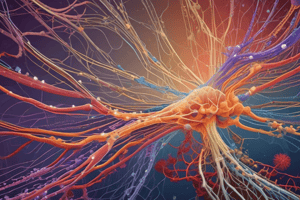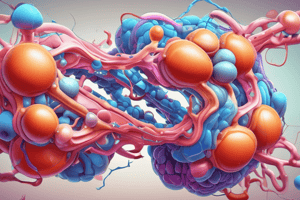Podcast
Questions and Answers
कौन सा कथन सही है?
कौन सा कथन सही है?
- कोशिका जीवन और उसकी क्रियाओं के बारे में हमें गहरी समझ प्रदान करती है।
- कोशिका जीवन और उसकी क्रियाओं के बारे में हमें केवल मानक समझ प्रदान करती है।
- कोशिका जीवन और उसकी क्रियाओं के बारे में हमें समझने में मदद करती है, लेकिन पूरी समझ प्रदान नहीं करती। (correct)
- कोशिका जीवन और उसकी क्रियाओं के बारे में हमें पूर्ण समझ प्रदान करती है।
किसे कहा गया है कि कोशिका जीवन महत्वपूर्ण है?
किसे कहा गया है कि कोशिका जीवन महत्वपूर्ण है?
- संपूर्ण समझ प्रदान करने में
- इलाज और थेरेपी से संबंधित नई प्रौद्योगिकियों के विकास में (correct)
- कैंसर और ज्ञाति विकारों के कारणों में
- न्यू ट्रीटमेंट्स और थेरेपी से संबंधित नई प्रौद्योगिकियों के विकास में
क्या हमें किससे संपूर्ण समझ प्राप्त हुई है?
क्या हमें किससे संपूर्ण समझ प्राप्त हुई है?
- मनुष्य (correct)
- कोशिका जीवन
- समुंदर
- कोशिका
कोशिका जीवन का प्रमुख प्रत्यक्ष प्रति-प्रति प्रकार है?
कोशिका जीवन का प्रमुख प्रत्यक्ष प्रति-प्रति प्रकार है?
सेल बायोलॉजी का क्षेत्र किस पर ध्यान केंद्रित है?
सेल बायोलॉजी का क्षेत्र किस पर ध्यान केंद्रित है?
सेल को किसे कहा जाता है जो जीवन की विभिन्न क्रियाएँ संभाल सकते हैं?
सेल को किसे कहा जाता है जो जीवन की विभिन्न क्रियाएँ संभाल सकते हैं?
सेल का आकार और आकृति किस पर निर्भर करती है?
सेल का आकार और आकृति किस पर निर्भर करती है?
सही कहा गया है कि सेल क्या है?
सही कहा गया है कि सेल क्या है?
किस शताब्दी में सेल सिद्धांत विकसित हुआ था?
किस शताब्दी में सेल सिद्धांत विकसित हुआ था?
कोशिका में कौन-से अंग होते हैं, जो कोशिका के आणु से ऊर्जा उत्पन्न करते हैं?
कोशिका में कौन-से अंग होते हैं, जो कोशिका के आणु से ऊर्जा उत्पन्न करते हैं?
कोशिका का मुख्य अंग है, जो कोशिका के आनु परम्परा को संचित करता है।
कोशिका का मुख्य अंग है, जो कोशिका के आनु परम्परा को संचित करता है।
कोशिका में प्रोटीन संघटन में कौन-सा अंग महत्वपूर्ण भूमिका निभाता है?
कोशिका में प्रोटीन संघटन में कौन-सा अंग महत्वपूर्ण भूमिका निभाता है?
कौन-सी प्रक्रिया में कोशिका का भागों में विभाजन होता है, जिससे दो पुत्र कोशिकाएं बनती हैं?
कौन-सी प्रक्रिया में कोशिका का भागों में विभाजन होता है, जिससे दो पुत्र कोशिकाएं बनती हैं?
कौन-सी प्रक्रिया में कोशिका का समाप्त होने की प्रक्रिया होती है?
कौन-सी प्रक्रिया में कोशिका का समाप्त होने की प्रक्रिया होती है?
करमल महाभाग कि प्रक्रिया में कौन-से प्रकार के पुत्र कोशिकाएं बनती हैं?
करमल महाभाग कि प्रक्रिया में कौन-से प्रकार के पुत्र कोशिकाएं बनती हैं?
Flashcards are hidden until you start studying
Study Notes
Biology: An Overview
Biology is the scientific study of life and living organisms, their structure, behavior, function, growth, evolution, distribution, and interactions with each other and the environment. Biology can be divided into several branches, including cell biology, genetics, evolution, and ecology. In this article, we will focus on the branch of biology that deals with the structure, function, and behavior of cells: cell biology.
Cell Biology: An Overview
Cell biology is a subfield of biology that focuses on the study of cells, which are the basic unit of life. Cells are the smallest units of an organism that can independently carry out the various functions of life, such as metabolism, growth, and reproduction. Cells are typically microscopic, but they come in a wide variety of shapes and sizes.
The History of Cell Biology
The study of cells began in the late 16th century when the Dutch microscopist Antonie van Leeuwenhoek observed and described single-celled organisms through a single-lens microscope. However, it wasn't until the 19th century that the cell theory was developed, which states that all living organisms are made up of one or more cells, and that cells are the basic unit of structure and function.
The Structure of Cells
Cells are composed of a variety of structures and organelles, which are specialized subunits that perform specific functions within the cell. These organelles include the nucleus, which contains the cell's genetic material; the mitochondria, which produce energy; the endoplasmic reticulum, which plays a role in protein synthesis; and the Golgi apparatus, which modifies and packages proteins and lipids.
The Function of Cells
Cells carry out a wide range of functions, including metabolism, which is the process of breaking down nutrients and synthesizing new molecules; growth and reproduction, which involve the production of new cells; and response to stimuli, which allows cells to adapt to changes in their environment.
The Life Cycle of Cells
Cells go through a series of stages during their life cycle, including mitosis, which is the process of cell division that results in the formation of two daughter cells; meiosis, which is the process of cell division that results in the formation of four haploid daughter cells; and cell death, which is the process of programmed cell death that occurs in multicellular organisms.
The Significance of Cell Biology
The study of cell biology has had a profound impact on our understanding of biology and medicine. Cell biology has provided insights into the causes of many diseases, such as cancer and genetic disorders, and has led to the development of new treatments and therapies. Additionally, cell biology has contributed to the development of new technologies, such as biotechnology and genetic engineering.
In conclusion, cell biology is a fascinating and important field of study that has provided us with a wealth of knowledge about the structure, function, and behavior of cells. By studying cells, we have gained a deeper understanding of life and the processes that govern it. As our knowledge of cell biology continues to grow, we can expect to see even more exciting
Studying That Suits You
Use AI to generate personalized quizzes and flashcards to suit your learning preferences.




